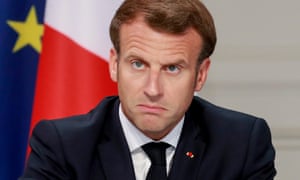
France should be proud of what its people – and government – have achieved in the battle against the coronavirus, Emmanuel Macron told the nation in his most recent address. Unfortunately, the country seems in no particular mood to listen.
With two years of his five-year term left, the 42-year-old French president’s agenda of economic and social reform – aimed at spurring growth, creating jobs and deregulating the economy – has been thrown badly off track by Covid-19.
But as he ponders ways to reset his presidency before a re-election bid in 2022, Macron – who is expected to announce a government reshuffle, and possibly a new prime minister, next month – must overcome more than just the fallout from the pandemic, which is predicted to shrink France’s economy by 11% this year.
He is also battling a critical – if not outright hostile – French public; an anticipated avalanche of dreadful local election results on 28 June; and ever more evident splits in the centrist La République en Marche (LREM) movement that he led to sweeping presidential and parliamentary victories in 2017.
Despite undeniable blunders, France has, by most measures, handled the pandemic reasonably well – and better than comparable neighbours such as Spain, Italy and Britain (although not, importantly for French voters, Germany).
The country should probably have imposed its mandatory lockdown several days earlier than it did, on 16 March, and should certainly have been more honest about an early shortage of masks – and more energetic in building up testing capacity.

But France contained the virus largely to the greater Paris region and the north-east; was quick to propose a generous €500bn (£450m) aid package for businesses that has protected more than 11 million employees; and has managed its exit from lockdown smoothly.
The number of new infections has fallen steadily, to a recent seven-day average of about 450, compared with 4,500 in late March. Daily deaths have followed a similar curve since a peak of nearly 1,500 on 15 April and now average about 35. Cinemas, and all schools for the under-16s, opened again on Monday.
“We have nothing to be ashamed of,” Macron said in his address on 14 June. “In how many countries was all this done? That’s fortunate and it shows the strength of our state and our social model. We can be proud of what was done and of our country.”
But French voters, almost always more critical of their rulers than most, are not buying it – or Macron.
In March, an early “rally round the flag” effect propelled popular satisfaction with some EU governments’ handling of the crisis to 70% or even 80%; in France, it never exceeded 54%.
According to the pollster Ifop, Macron’s personal approval rating is 38%: not disastrous compared with his recent predecessors as French president, but down 11 percentage points from the start of the pandemic. “Many French are stunned,” said Ifop’s Jérôme Fourquet. “There is a feeling France has fallen from its pedestal.”
The president’s ailing popularity has many causes besides his perceived errors in handling Covid-19. Having blown up France’s political landscape, crushing the main centre-left and centre-right parties on his way to the Élysée, he has no established tribe on which he can rely to back him come what may.
Strongly partisan voters on left and right loathe Macron. While he retains the reasoned support of many in the centre, polls show a clear majority of voters, despite his recent efforts to appear more relatable, continue to see him as aloof and imperious.
His LREM movement, meanwhile, is struggling to transition from raw political startup to functioning party machine. Last month, 17 MPs – mainly disgruntled former Macron supporters who feel the party, contrary to its pledge to be “neither left nor right”, is distinctly more right than left – formed a new parliamentary group.
Ecology, Democracy, Solidarity is not formally part of the opposition, but has warned it will vote against the government if it feels it warranted. The move cost LREM its outright majority and was a significant symbolic blow, even if the party still has a comfortable working majority thanks to other centrists in parliament.
Nor will the second round of France’s local elections, delayed by the pandemic, provide much encouragement. In Paris, the Socialist mayor, Anne Hidalgo, is on course for re-election after a disastrous LREM campaign; elsewhere, one-time Macron allies face excommunication after sealing electoral pacts with rivals.
For these reasons and more – even if an early Ifop poll this week saw him winning the 2022 election by 10 points against the far-right leader, Marine Le Pen – Macron’s presidency is in need of a reboot if he is to avoid ejection after one term (unlike his two most recent predecessors, Nicolas Sarkozy and François Hollande).

He has promised to “reinvent” himself – and present a detailed plan for the final two years of his mandate – next month. With the positive impact of some initial reforms (such as 800,000 new jobs) set to be mostly wiped out by Covid-19, most observers assume that this will entail at least the appearance of a shift to the left.
The president signalled this in his 14 June address, promising a “new path” for the second half of his mandate, heavy on greener economic policies, more social solidarity and a greater emphasis on national production. “Our first priority will be to rebuild an economy that is strong, ecological, sovereign and united,” he said, but also “founded on hard work”.
Acknowledging the crisis had “exposed our shortcomings and weaknesses, our dependence on others for certain products, our organisational handicaps,” he promised “massive investment” in education, greater “technological, digital, industrial and agricultural independence” and more power to local authorities.
Since it is standard practice for French presidents to sack their prime ministers to mark a fresh start, an early victim of the administration’s expected step-change could be his loyal prime minister, Édouard Philippe, a conservative who never joined LREM and is, for most French voters, clearly associated more with the right than the left.
With a broader cabinet reshuffle predicted for early July, Philippe may be seen as expendable despite – or perhaps because of – his sharply increased popularity: public approval of Macron’s calm, competent prime minister has surged to more than 50% during the crisis, at least a dozen points higher than the president’s.
So, Macron faces a dilemma: replace a credible, well-liked prime minister (and possibly create a future rival) or risk being eclipsed as he struggles to chart a more caring, eco-friendly, post-coronavirus course in the run-up to 2022. It is not the biggest decision the president faces, but it could be one of the more significant.
source https://www.theguardian.com/world/2020/jun/25/macron-promise-to-reinvent-himself-may-not-save-his-presidency



0 تعليقات